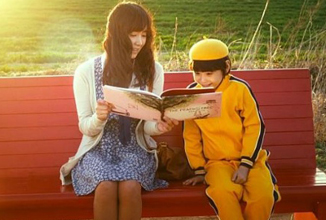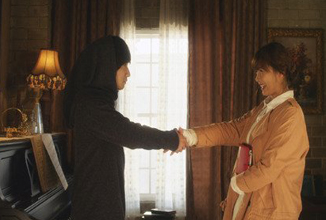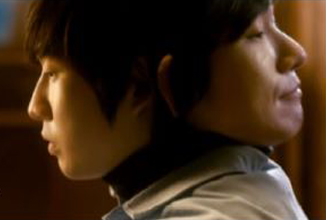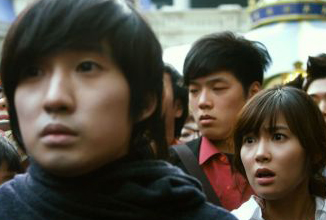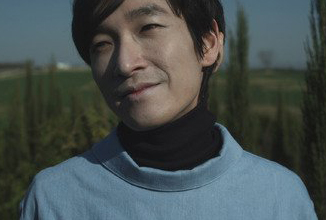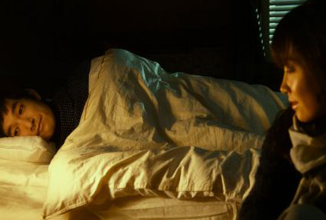
 |
||||||
Synopsis: Young couple Cheol-min and Si-yeon, who have been praying for a baby above all else for some time, are overjoyed to finally discover that not only is Si-yeon pregnant but she is in fact to give birth to twin boys. However, their happiness is short-lived - quickly turning to dismay - when the boys are born conjoined; sharing one body. While Cheol-min does his best to accept the babies from the outset, in spite of their disfigurement, Si-yeon finds it impossible to set aside her utter abhorrence of her offspring and, having been prevented from murdering the "monster" beneath the family's peach tree, she quickly loses her grip on reality and passes away in shame.
Left to raise the children (Dong-hyun and Sang-hyun) on his own, Cheol-min decides his only course of action is to hide the boys away, shielding them from any would-be prying eyes and taking care of their every need himself, but as the boys grow to adulthood it becomes increasingly clear that Dong-hyun (the more dominant of the twins) desperately wants to become a writer - a dream that will only be fulfilled with the help of someone from the outside world - and so, with great trepidation, Cheol-min invites beautiful young artist and ex-publishing company employee Seung-ah into their home to meet Dong-hyun and provide illustrations for his first book, The Peach Tree. The question is how long the conjoined nature of Dong-hyun and Sang-hyun can be kept a secret from her...
Review: Over the years, stories of acceptance (of oneself; by others and/or culture at large) as well as the treatment of those with disabilities have played a not-insignificant role in Korean cinema: From Lee Chang-dong's utter masterpiece 'Oasis', to Park Chul-soon's uplifting 'Lovable', to Hwang Dong-hyeok's harrowing and heartbreaking true-life tale 'The Crucible', and at various points in between, each has strived to give its own perspective on the issue of affliction and its somewhat uneasy, regularly unwelcome and often enforced setting outside the 'norms' of society. Similarly, 'The Peach Tree' has a great deal to say and while its initial detailing of Si-yeon's inability to come to terms with Dong-hyun and Sang-hyun's disability - or even to accept the fact that she gave birth to what she deems a monstrous abhorrence of nature - plays only a tiny outward part in proceedings it nonetheless deftly underpins the boys' psyches throughout their entire story; the majority of the themes of acceptance being Dong-hyun and Sang-hyun's understanding of themselves and acquiescence of each other but their continued efforts to convince themselves that they were approved of, and ultimately loved by, their mother - their need to tell themselves that she had smiled even once when she looked at them - ultimately shapes the very core of who they are.
With the introduction of Seung-ah to the story, it would have been all too easy to use her character as the personification of society's perceptions and prejudices at large but thankfully 'The Peach Tree' takes a far more nuanced approach and, in fact, when the outside world eventually becomes aware of Dong-hyun and Sang-hyun and tries to create the 'freak show' it was always bound to, Seung-ah comes to stand as the reason within the insanity; the love within the voyeurism; and the acceptance within a largely uncaring world.
Any film detailing a severe physical disability, of course, brings with it the question of how that disfigurement will be realised cinematically. In a Hollywood blockbuster that would likely be achieved by use of copious computer generated imagery but in a much smaller film, budget-wise, such an extravagance clearly isn't an option and so a far more thoughtful approach is called for. Thus, 'The Peach Tree' chooses to show Dong-hyun and Sang-hyun's conjoined nature by having a single head with two faces - each at 180º to the other - and that decision both largely helps and slightly hinders the film as a whole:
Overall, 'The Peach Tree' has a fairly standard Korean cinema progression of drama and understated romance leading eventually to melodrama but gently so throughout, and though the narrative does aim specifically and deliberately at both the heartstrings and tear ducts it does nonetheless manage to be surprising at more than one point during its duration and in the film's conclusion.
Any Korean film detailing themes of acceptance, or lack thereof, within a narrative centred on disability almost cannot fail to bring with it mention of and/or contrasts to Lee Chang-dong's masterful 'Oasis', among others, but while such comparative dissections could be considered by some as partly if not wholly unfair, they are to my mind validated by the fact that Koo Hye-sun's 'The Peach Tree' largely manages to hold its own fairly well in the face of such utterly illustrious company; albeit with one or two minor caveats attached. Directed by: Koo Hye-sun
|
||||||
All images © M-Line Distribution, KOFIC and KoBiz Review © Paul Quinn |
||||||
